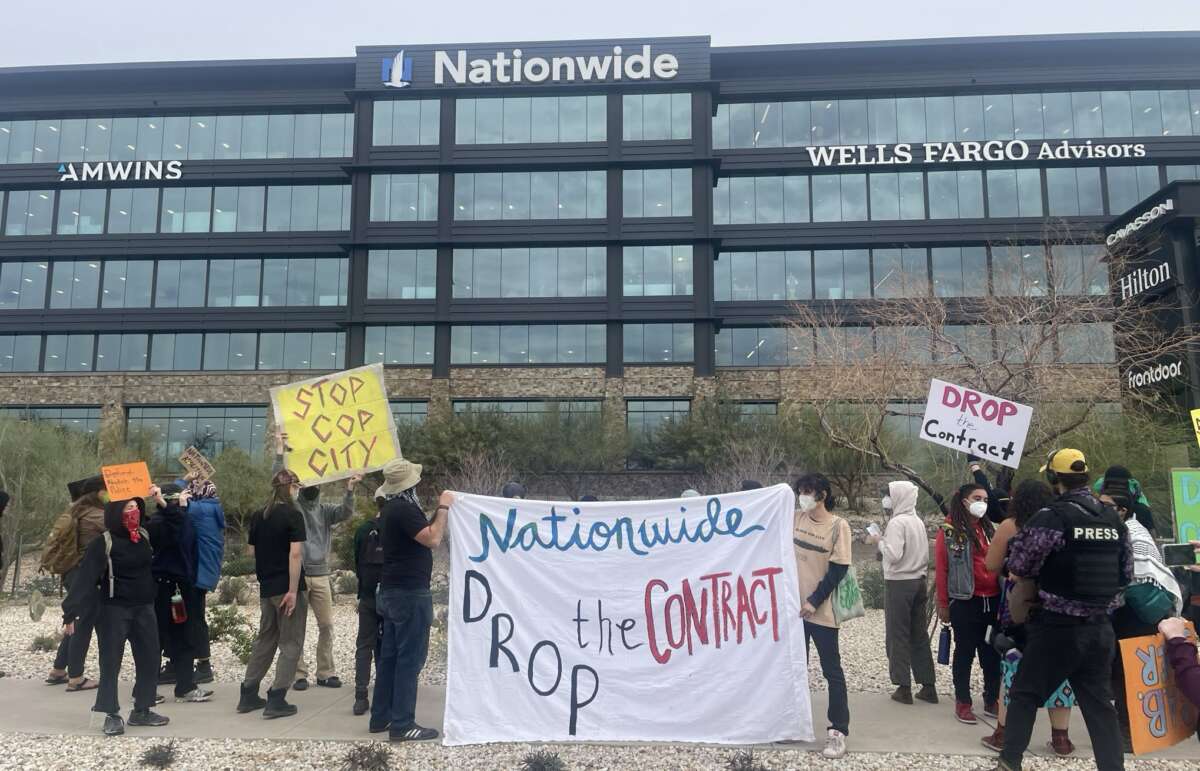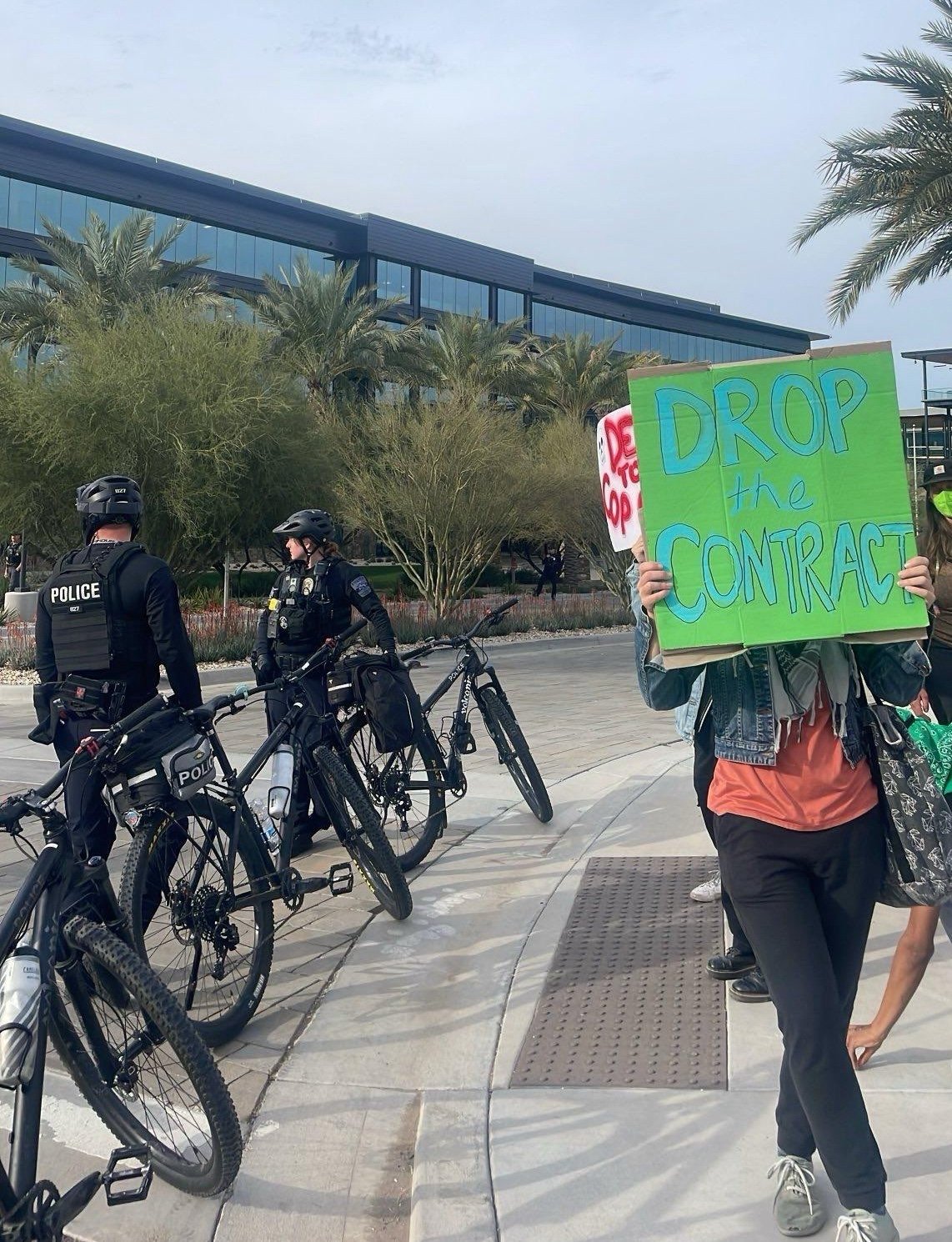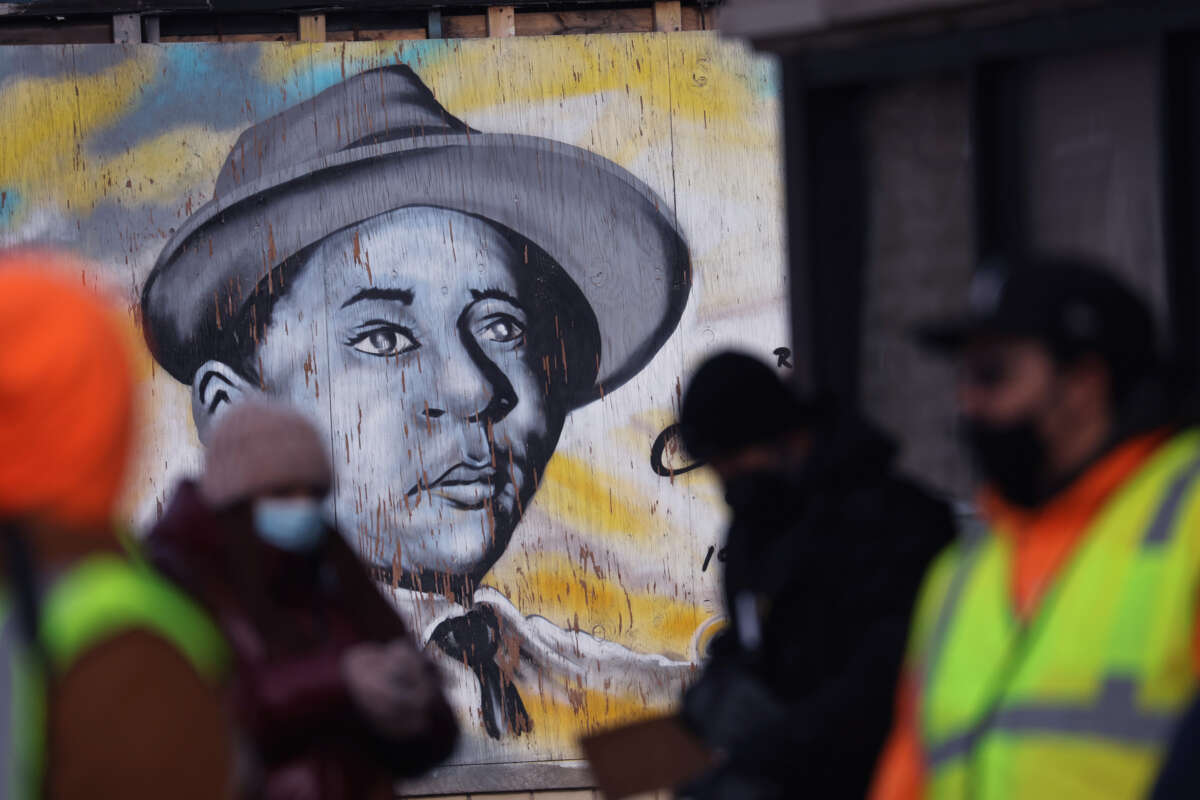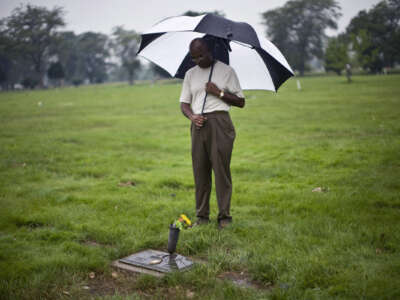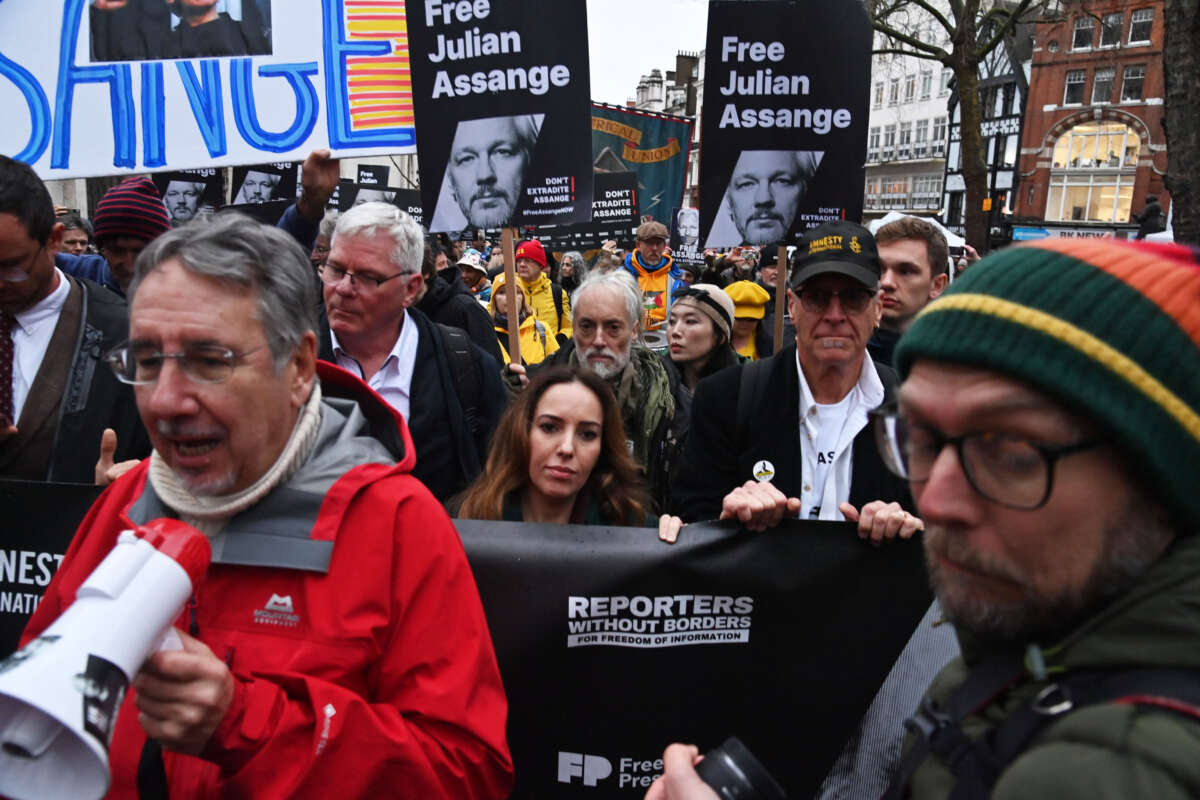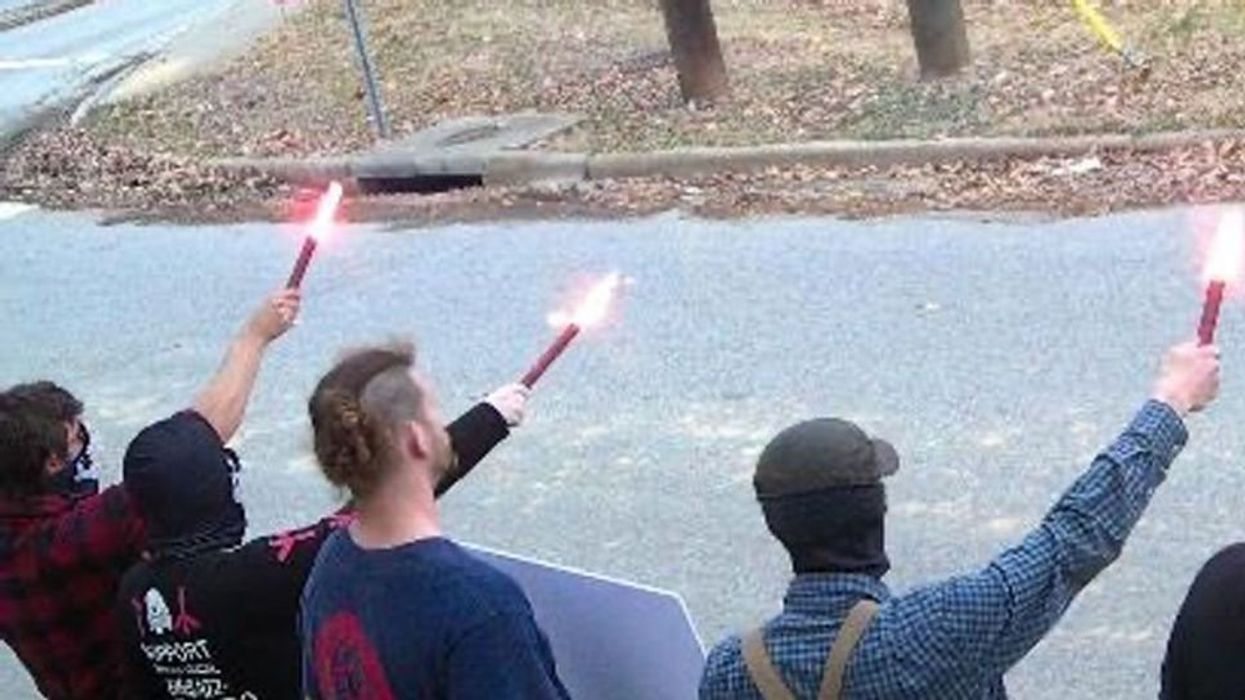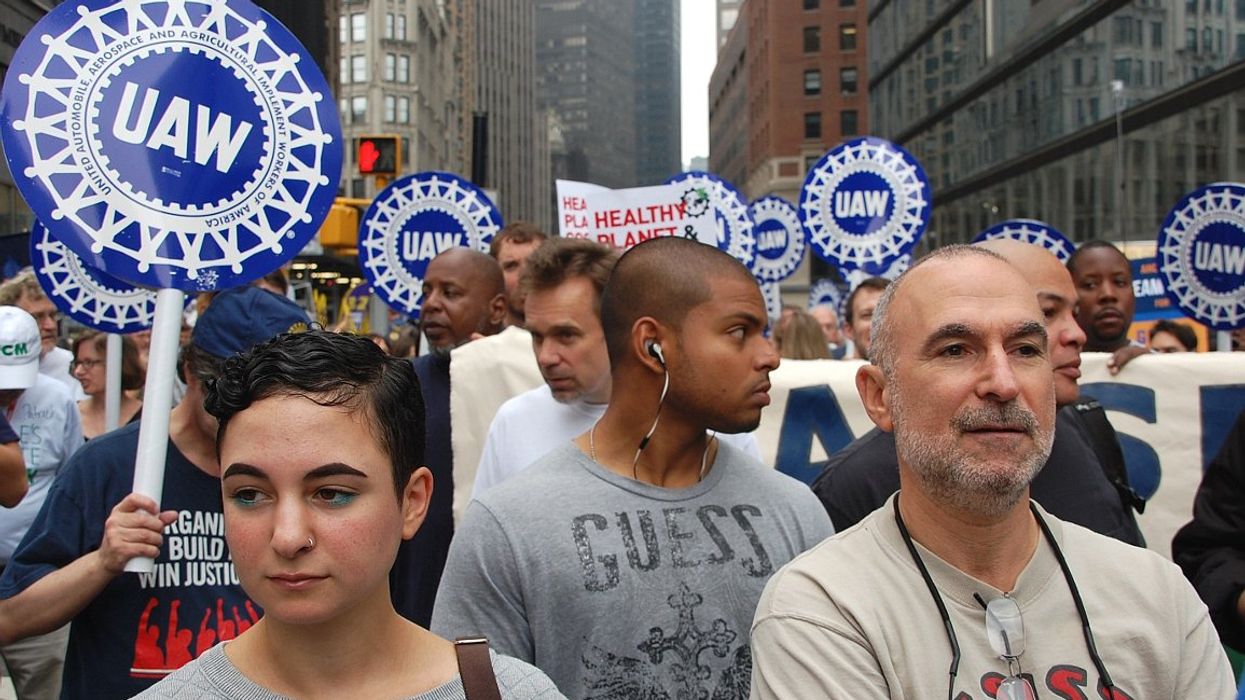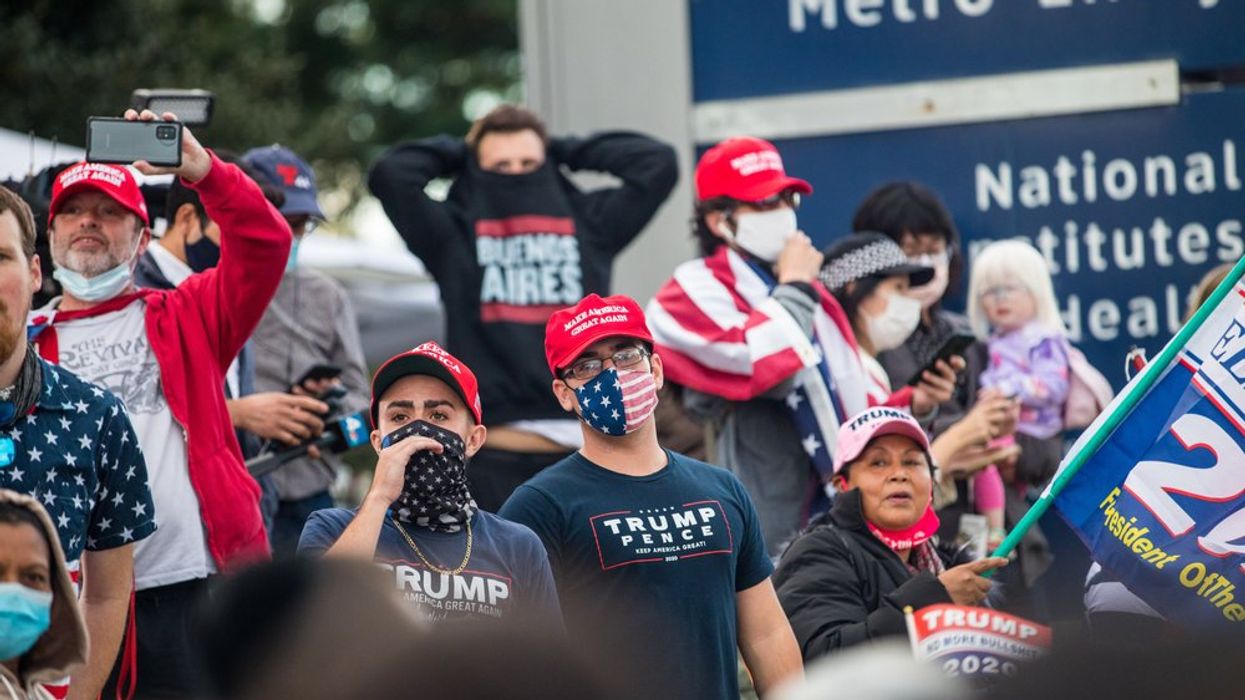US Refuses to Assure UK Judges That Assange Won’t Be Executed If He’s Extradited
UK law prohibits extradition to a country that may impose capital punishment.
February 27, 2024
Stella Assange (center-left) attends the rally for Julian Assange on February 21, 2024, in London, England.
DAVE BENETT / DAVE BENETT / GETTY IMAGES
On February 20 and 21, as hundreds of Julian Assange’s supporters gathered outside the London courthouse, a two-judge panel of the High Court of Justice presided over a “permission hearing.” Assange’s lawyers asked the judges to allow them to appeal the home secretary’s extradition order and raise issues that the district court judge had rejected without full consideration.
The High Court panel, Dame Victoria Sharp and Justice Jeremy Johnson, were concerned that the U.S. government could execute Assange under the Espionage Act if he is extradited to the United States, a penalty outlawed in the U.K. Although Assange faces 175 years in prison for the charges alleged in the indictment, there is nothing to prevent the U.S. from adding additional offenses which would carry the death penalty.
The Trump Administration Indicted Assange for Exposing U.S. War Crimes
Assange is charged with 17 counts of alleged violations of the Espionage Act, based on obtaining, receiving, possessing and publishing national defense information. He is accused of “recruit[ing] sources” and “soliciting” confidential documents just by maintaining the WikiLeaks website that stated it accepted such materials. Assange is also charged with one count of “conspiracy to commit computer intrusion” with intent to “facilitate [whistleblower Chelsea] Manning’s acquisition and transmission of classified information related to the national defence of the United States.”
The basis for the indictment, Assange’s lawyers told the panel, is WikiLeaks’s “exposure of criminality on the part of the U.S. government on an unprecedented scale.” Assange is charged for revealing war crimes committed by the United States in Iraq, Afghanistan and Guantánamo Bay. The indictment has nothing to do with Hillary Clinton and the 2016 election or Swedish allegations of sexual misconduct, which have been dropped.
WikiLeaks revealed the “Iraq War Logs” — 400,000 field reports including 15,000 unreported deaths of Iraqi civilians, as well the as systematic rape, torture and murder after U.S. forces handed over detainees to a notorious Iraqi torture squad. The revelations also included the “Afghan War Diary” — 90,000 reports of more civilian casualties by coalition forces than the U.S. military had reported.
This is the first time a publisher has been charged under the Espionage Act for disclosing government secrets. By Marjorie Cohn , TRUTHOUT July 15, 2023
In addition, WikiLeaks revealed the “Guantánamo Files,” 779 secret reports with evidence that 150 innocent people had been held at Guantánamo Bay for years, and 800 men and boys had been tortured and abused, in violation of the Geneva Conventions and the Convention Against Torture and Other Cruel, Inhuman or Degrading Treatment or Punishment.
WikiLeaks also revealed the notorious 2007 “Collateral Murder Video,” in which a U.S. Army Apache attack helicopter targeted and killed 11 unarmed civilians in Baghdad, including two Reuters journalists and a man who came to rescue the wounded. Two children were injured. The video contains evidence of war crimes prohibited by the Geneva Conventions.
And WikiLeaks exposed “Cablegate” — 251,000 confidential U.S. State Department cables that “disclosed corruption, diplomatic scandals and spy affairs on an international scale.” According to The New York Times, they told “the unvarnished story of how the government makes its biggest decisions, the decisions that cost the country most heavily in lives and money.”
“These were the most important revelations of criminal U.S. state behavior in history,” Assange attorney Mark Summers argued to the High Court panel.
Assange’s Appellate Issues
Assange is asking the U.K. High Court to review issues of treaty obligations, human rights violations and political persecution.
The U.S.-U.K. Extradition Treaty would allow the U.S. to amend or add charges which could expose Assange to the death penalty, a punishment prohibited in the U.K. In response to questioning by one of the judges, the prosecutor admitted that the U.S. had not provided assurances that Assange would not be subject to the death penalty if extradited.
Article 4(1) of the extradition treaty does not allow extradition for political offenses. Espionage is the “quintessential” political offense, Assange attorney Edward Fitzgerald told the panel. “The gravamen (and defining legal characteristic) of each of the charges is thus an alleged intention to obtain or disclose US state secrets in a manner that was damaging to the security of the US state,” which makes them political offenses, Assange’s lawyers wrote. The defense claimed it was an abuse of process for the United States to pursue extradition of Assange for a political offense.
The U.S. argued that the U.K. Extradition Act does not contain an explicit exception for political offenses. But the defense said that the political offense exclusion is an “age-old” prohibition found in “virtually every” U.K. extradition treaty. It is included in U.K. treaties with “156 out of 158” countries. Fitzgerald said you can’t infer a deliberate intention to forbid extradition for political offenses from the absence of explicit language in the Extradition Act. Since the exception is not specifically included in the act, U.K. District Judge Vanessa Baraitser didn’t fully consider the issue in her ruling after Assange’s extradition hearing.
“This prosecution is motivated by … a concerted intent to destroy or inhibit the publishers of evidence of state criminal ability, and thereby put a stop to the process of investigating, prosecuting and preventing such international crimes in the future.”
Article 7 of the European Convention on Human Rights (ECHR) says, “No one shall be held guilty of any criminal offence on account of any act or omission which did not constitute a criminal offence under national or international law at the time when it was committed.” Assange could not have been reasonably expected to know that he could be prosecuted for publishing in the public interest, because no publisher had ever been prosecuted under the Espionage Act for publishing in the public interest before.
Article 10 of the ECHR protects freedom of expression, which includes the right “to receive and impart information and ideas without interference by public authority and regardless of frontiers.” The information that WikiLeaks revealed was true and Manning was acting in good faith and in the public interest when she provided it to WikiLeaks. Extradition would constitute a “flagrant denial” of Assange’s right to freedom of expression, particularly because he might be denied the protection of the First Amendment to the U.S. Constitution, Assange’s lawyers argued to the panel.
Article 6 of the ECHR guarantees the right to a fair trial — It will be very difficult for Assange to get a fair trial if he is extradited to the United States. Assistant District Attorney Gordon Kromberg and former CIA Director Mike Pompeo said that as a non-U.S. citizen, Assange has no First Amendment rights. The First Amendment allows journalists to publish material that was illegally obtained by a third person if it is a matter of public interest. Justice Johnson was concerned that the U.S. had given no assurances that foreign nationals have First Amendment protection and asked both sides to provide clarity on this issue. Additionally, if extradited, Assange would be prosecuted in a federal court in the Eastern District of Virginia, where the jury pool will be drawn from people associated with the U.S. government national security agencies and contractors.
Articles 2 and 3 of the ECHR protect the right to life and the right to be free from torture or inhuman or degrading treatment, respectively. Evidence emerged after Assange’s extradition hearing in Baraitser’s court that the CIA planned to kidnap and assassinate Assange, an indication he will likely be subject to inhuman and degrading treatment if extradited to the U.S. “If these state agencies were prepared to go to these lengths whilst he was under the protection of an embassy and located in the UK, there must be a real risk of similar extra-judicial measures or reprisals if he is extradited to the US,” Assange’s lawyers wrote.
Article 4(3) of the extradition treaty forbids extradition if the request is politically motivated and not made in good faith. Assange’s lawyers wrote that “this prosecution is motivated by matters other than the proper and usual pursuit of criminal justice. It is motivated instead by a concerted intent to destroy or inhibit the publishers of evidence of state criminal ability, and thereby put a stop to the process of investigating, prosecuting and preventing such international crimes in the future.” One panel judge asked the defense where they could find more information on this point.
Summers argued to the panel that although the WikiLeaks revelations at issue in the indictment occurred in 2010-2011, Assange wasn’t indicted until 2018-2019. That was because WikiLeaks revealed CIA spying tools in 2017, known as “Vault 7,” which enabled the CIA to tap into people’s cell phones and smart TVs, turning them into listening devices. Those revelations infuriated Donald Trump’s CIA Director Pompeo, who denounced WikiLeaks as a “hostile, non-state intelligence service,” a designation that would allow the CIA to act without the knowledge of Congress. U.S. officials drew up plans to kidnap and/or kill Assange. The Justice Department expedited the indictment of Assange to facilitate prosecution once he was sent by extraordinary rendition to the U.S. “This prosecution only emerged because of that rendition plan,” Summers said.
“The Most Important Revelation Since Abu Ghraib”
The Collateral Murder video is “the most important revelation since Abu Ghraib,” Summers told the panel. “The cables Assange published disclosed extrajudicial assassinations, rendition, torture, dark prisons and drone killings.” Summers said the Guantánamo Files revealed a “colossal criminal act.” The defense pointed out that WikiLeaks’s revelations actually saved lives. After WikiLeaks published evidence of Iraqi torture centers established by the U.S., the Iraqi government refused President Barack Obama’s request to grant immunity to U.S. troops who committed criminal and civil offenses there. As a result, Obama had to withdraw U.S. forces from Iraq.
The Obama administration, which prosecuted more whistleblowers under the Espionage Act than all prior U.S. administrations combined, considered prosecuting Assange, but feared it would violate the First Amendment. The administration was unable to distinguish what WikiLeaks did from what The New York Times and The Guardian did since they also published documents that Chelsea Manning had leaked.
But the Trump administration did indict Julian Assange. The U.K. arrested Assange and has held him in Belmarsh Prison for nearly five years pending a decision on whether he should be extradited to the U.S. to stand trial.
In January 2021, following a three-week hearing, Baraitser denied extradition after finding that Assange’s mental health was so frail there was a “substantial risk” of suicide if he was extradited to the U.S. because of the harsh conditions of confinement in which he would be held. But she rejected all other legal objections to extradition that Assange had raised.
U.S. “Assurances” That Assange Will Be Treated Humanely
After Baraitser had already ruled, the U.S. came forward with diplomatic “assurances” that Assange would be treated humanely if extradited to the United States. The Biden administration assured the court that Assange: (1) would not be subject to onerous Special Administrative Measures (SAMs) that would keep him in extreme isolation and monitor his confidential communications with his attorneys; (2) would not be housed at the notorious ADX Florence maximum security prison in Colorado; (3) would receive psychological and clinical treatment in custody; and (4) could serve any custodial sentence in Australia.
But the U.S. said the assurances wouldn’t apply if Assange committed a “future act” that “met the test” for the SAMs. That unspecified contingency would be based on a subjective determination of prison authorities with no judicial review.
Although the United States has reneged on nearly identical assurances in the past, the High Court accepted them at face value, saying it was satisfied that the U.S. was acting in good faith, and in December 2021, the High Court reversed Baraitser’s denial of extradition.
However, in a 2023 decision, the U.K. Supreme Court unanimously held that the court has an independent duty to determine the validity of assurances, writing, “The government’s assessment of whether there is such a risk is an important element of that evidence, but the court is bound to consider the question in the light of the evidence as a whole and to reach its own conclusion.”
In June 2023, a single High Court judge, Jonathan Swift, refused Assange permission to appeal in a cursory three-page ruling. The hearing on February 20 and 21 was an effort by Assange’s legal team to reverse that decision so that the High Court will entertain his appeal.
Assange Redacted Names of Informants to Protect Them
At the February 21 hearing, prosecutor Clare Dobbin told the panel that documents in which names hadn’t been redacted were published, putting the individuals and the U.S. at grave risk. One of the judges asked Dobbin if it wasn’t true that this information was published by others first, to which Dobbin replied that Assange was responsible for putting the information in the hands of others in the first place.
Several witnesses testified at the 2020 extradition hearing that Assange took great care to ensure that the names were redacted. Other outlets published the unredacted cables before WikiLeaks with no adverse consequences. John Young, from cryptome.org, testified at the extradition hearing and wrote in a Justice Department submission form, “Cryptome published the decrypted unredacted State Department Cables on September 1, 2011 prior to publication of the cables by WikiLeaks.” Digital experts testified that the publication of a password by Guardian journalists Luke Harding and David Leigh ultimately led to the unredacted publication.
Moreover, Brig. Gen. Robert Carr testified at Manning’s court martial that no one was harmed by the WikiLeaks releases. Summers told the panel that Baraitser never balanced the public interest in the disclosures against the fact that no harm came from them.
Conviction of Assange Would Chill Investigate Journalists From Exposing Government Secrets
In November 2022, The New York Times, The Guardian, Le Monde, DER SPIEGEL and El País signed a joint open letter calling on the Biden administration to drop the Espionage Act charges against Assange. They wrote, “Publishing is not a crime,” noting that Assange is the first publisher to be charged under the Espionage Act for revealing government secrets.
The indictment would punish conduct that national security journalists routinely engage in, including cultivating and communicating confidentially with sources and soliciting information from them, shielding their identities from disclosure, and publishing classified information. If Assange is prosecuted and convicted, it will discourage journalists both in the U.S. and abroad from publishing evidence of government wrongdoing.
No publisher has ever been prosecuted under the Espionage Act for disclosing government secrets. The U.S. government has never prosecuted a publisher for publishing classified information, which constitutes an essential tool of investigative journalism.
But rather than dropping Trump’s prosecution of Assange consistent with the position of the Obama-Biden administration, Joe Biden has zealously pursued extradition and prosecution.
Pending House Resolution Would Call for Dismissal of All Charges Against Assange
On December 13, 2023, House Resolution 934 was introduced in the U.S. House of Representatives by Rep. Paul A. Gosar (R-Arizona), with cosponsors from both political parties. It would express “the sense of the House of Representatives that regular journalistic activities are protected under the First Amendment, and that the United States ought to drop all charges against and attempts to extradite Julian Assange.” The resolution states that the WikiLeaks disclosures “promoted public transparency through the exposure of the hiring of child prostitutes by Defence Department contractors, friendly fire incidents, human rights abuses, civilian killings, and United States use of psychological warfare.”
Assange was charged with one count of the Computer Fraud and Abuse Act, HR 934 notes, “despite the fact that said intelligence analyst already had access to the mentioned computer, that the purported breaching of the Defense Department computers was impossible, and that there was no proof Mr. Assange had any contact with said intelligence analyst.” The conviction of Assange under the Espionage Act, the resolution continues, “would set a precedent allowing the United States to prosecute and imprison journalists for First Amendment protected activities, including the obtainment and publication of information, something that occurs on a regular basis.”
On February 14, I joined nearly 40 law professors in sending a letter to the Department of Justice, stating that the Espionage Act charges against Assange “pose an existential threat to the First Amendment.” We expressed alarm that the constitutional implications of prosecuting Assange “could extend beyond the Espionage Act and beyond national security journalism [to] enable prosecution of routine newsgathering under any number of ambiguous laws and untested legal theories.”
At the conclusion of the two-day hearing, the High Court panel set a due date of March 4 for further written submissions from the parties. If the court agrees to review at least one of Assange’s appellate issues, there will be a full hearing. Meanwhile, Assange, who is in poor physical and emotional health, remains in prison.
If the High Court denies his right to appeal, Assange can ask the European Court of Human Rights to hear his case. If that court finds “exceptional circumstances” and an “imminent risk of irreparable harm,” it can order provisional measures, including a stay of execution while the case is pending in the European court. But there is a danger that the U.K. could immediately extradite Assange to the United States before the European Court of Human Rights has a chance to consider Assange’s petition.
MARJORIE COHN is professor emerita at Thomas Jefferson School of Law, former president of the National Lawyers Guild, and a member of the national advisory boards of Assange Defense and Veterans For Peace, and the bureau of the International Association of Democratic Lawyers. She is founding dean of the People’s Academy of International Law and the U.S. representative to the continental advisory council of the Association of American Jurists. Her books include Drones and Targeted Killing: Legal, Moral and Geopolitical Issues. She is co-host of “Law and Disorder” Radio.



